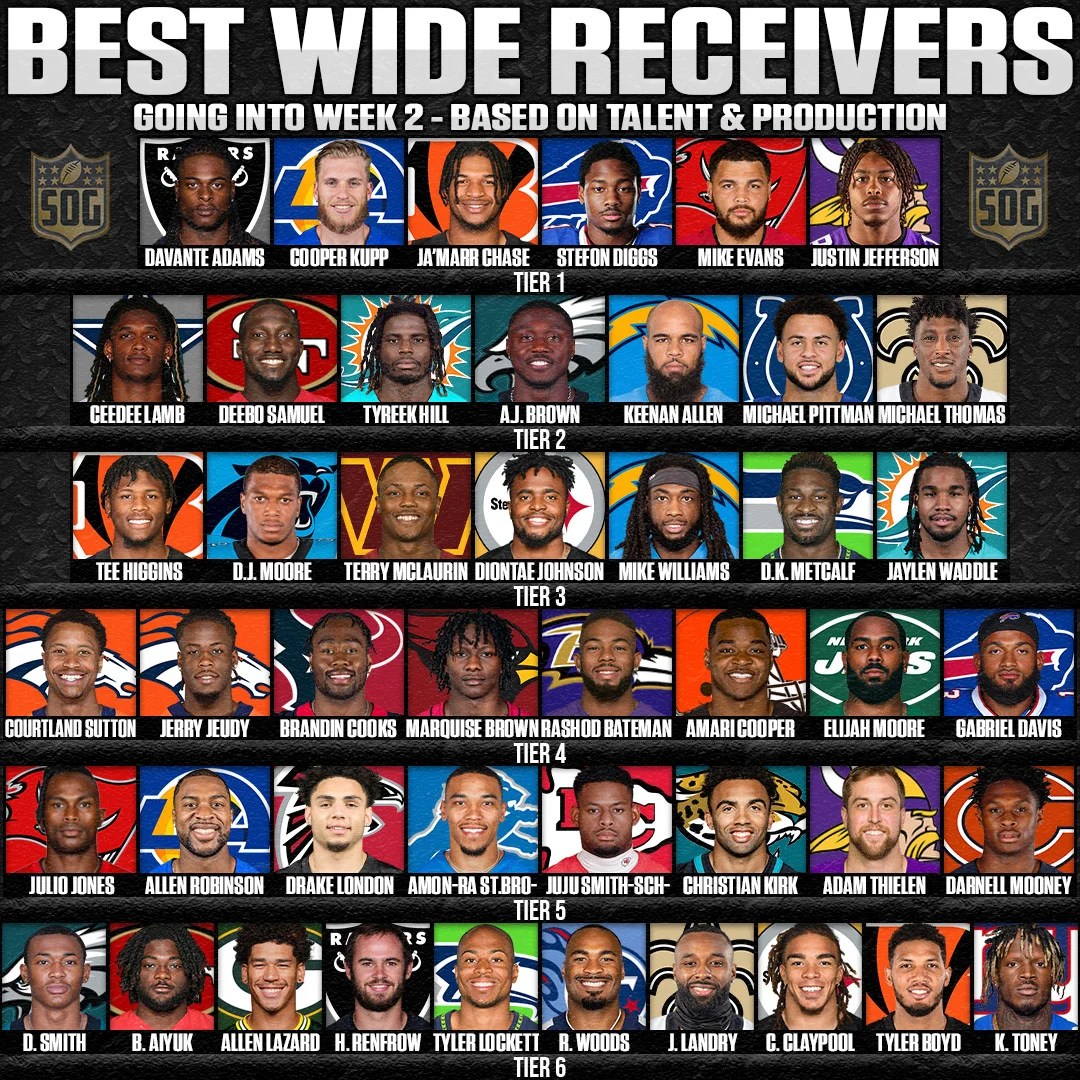Who is the greatest NFL wide receiver of all time? It's a question that ignites passionate debates among football fans, analysts, and historians. The pursuit of objectively ranking the best wide receivers in NFL history is a fascinating, yet ultimately subjective, endeavor.
Ranking the best NFL wide receivers across different eras presents unique challenges. How do you compare players who played under different rules, against different defenses, and with different quarterbacks? The game has evolved significantly over time, making direct comparisons difficult. Early receivers faced different defensive schemes and a less pass-oriented league than their modern counterparts.
Nevertheless, the allure of creating a historical hierarchy persists. We crave a way to celebrate the achievements of these extraordinary athletes and contextualize their impact on the game. This exploration of NFL wide receiver greatness takes us on a journey through football history, highlighting the evolution of the position and the legendary players who defined it.
The evolution of the wide receiver position is intricately linked to the evolution of the passing game itself. In the early days of the NFL, running the ball was king. As the forward pass gained prominence, so did the importance of skilled pass catchers. This evolution has led to the dynamic, high-flying offenses we see in the modern NFL.
Understanding NFL's greatest wide receivers requires acknowledging the context of their careers. Factors like quarterback play, coaching schemes, and the overall talent level of the league all contribute to a receiver's success. While statistics provide a valuable framework for evaluation, they don't tell the whole story. Intangibles like leadership, clutch performances, and impact on the game also play a significant role.
Debates around the top NFL wide receivers often center on comparing statistics across eras. Adjusting for era is a crucial, yet complex, part of this evaluation. For example, comparing receiving yards in the 1960s to receiving yards in the 2020s requires considering the significant increase in passing attempts and overall offensive production over time.
One simple example of the complexities of these rankings is comparing Jerry Rice's incredible career totals with those of a modern receiver playing in a more pass-happy era. While Rice's records are monumental, it's worth considering how his numbers might have looked had he played in today's NFL.
The value of these rankings extends beyond mere entertainment. Studying all-time great wide receivers offers insights into the evolution of the game, the development of offensive strategies, and the attributes that define exceptional players. They spark conversations, fuel debates, and connect generations of football fans.
Creating a definitive ranking is an impossible task, but the process itself is rewarding. Engaging in these discussions enhances our appreciation for the rich history of the NFL and the extraordinary athletes who have graced the gridiron.
Thinking about constructing your own rankings? Consider factors like career longevity, statistical dominance, impact on the game, and overall legacy. While statistics are important, also consider the "eye test" and the impact these players had on their teams and the sport itself. Research different eras and consider the context of each player's career.
Advantages and Disadvantages of All-Time Rankings
| Advantages | Disadvantages |
|---|---|
| Sparks discussion and celebrates achievements | Difficult to compare across eras |
| Provides historical context and perspective | Subjectivity and potential for bias |
| Enhances appreciation for the game's evolution | Overemphasis on statistics |
Five examples of legendary NFL wide receivers frequently included in all-time rankings include Jerry Rice, Randy Moss, Terrell Owens, Marvin Harrison, and Calvin Johnson. Each of these players dominated their respective eras, leaving a lasting impact on the game.
One challenge in creating all-time rankings is accounting for rule changes. A solution is to analyze how rule changes impacted the game during a specific player's career and consider that context in the evaluation.
Frequently Asked Questions:
1. Who is widely considered the greatest wide receiver of all time? Many consider Jerry Rice to be the GOAT.
2. How do rankings account for rule changes? Analyzing how rule changes affected the game during a player's career is important.
3. What are the key statistics used in evaluating receivers? Receptions, yards, and touchdowns are key metrics.
4. How important are playoff performances? Playoff success is a valuable consideration.
5. How do you compare receivers from different eras? Contextualizing their careers within their respective eras is essential.
6. What role do intangibles play in rankings? Intangibles like leadership and clutch performances can elevate a player's legacy.
7. Are all-time rankings purely subjective? While subjectivity is inherent, statistical analysis provides a valuable framework.
8. How often are all-time rankings updated? Rankings can be revisited and revised as new players emerge and perspectives evolve.
One tip for evaluating receivers is to watch game film, beyond just looking at statistics. This allows you to observe their route running, ability to make contested catches, and overall impact on the game.
The quest to determine the greatest NFL wide receivers of all time is a journey through football history, filled with captivating stories and legendary performances. While a definitive ranking remains elusive, the process of evaluation and debate enhances our appreciation for the evolution of the game and the incredible athletes who have shaped it. All-time rankings provide a valuable framework for understanding the history of the wide receiver position and spark conversations that connect generations of football fans. By exploring the careers of these exceptional players, we gain a deeper understanding of the game itself. Dive into the history, explore the stats, watch the highlights, and engage in the ongoing conversation surrounding the greatest NFL wide receivers of all time. It's a discussion that will continue to captivate football fans for generations to come.
Unlocking your cars paint code secrets
Effortless road tax renewal online
Walter v drive powering your performance on the water



